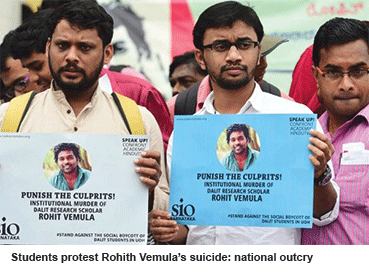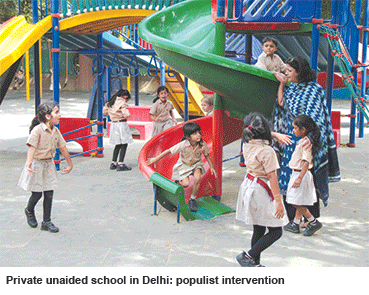 “i feel a growing gap between my soul and my body… The value of man was reduced to his immediate identity and nearest possibility. To a vote. To a number. To a thing. Never was a man treated as a mind… I am writing this kind of a letter for the first time. My first time of a final letter… I am just empty… That’s pathetic. And that’s why I am doing this,” wrote Rohith Vemula (26), a Ph D scholar at the University of Hyderabad (UoH), just before he hanged himself to death in the university’s hostel room on January 17.
“i feel a growing gap between my soul and my body… The value of man was reduced to his immediate identity and nearest possibility. To a vote. To a number. To a thing. Never was a man treated as a mind… I am writing this kind of a letter for the first time. My first time of a final letter… I am just empty… That’s pathetic. And that’s why I am doing this,” wrote Rohith Vemula (26), a Ph D scholar at the University of Hyderabad (UoH), just before he hanged himself to death in the university’s hostel room on January 17.
Following a national outcry, on January 28, Union HRD minister and former Indian soap star Smriti Irani ordered a single-judge commission headed by former Allahabad high court judge Ashok Kumar Roopanwal to “investigate the sequence of events and the circumstances leading to the suicide” and “enquire if the university followed University Grants Commission 2012 resolution on discrimination”. The commission is expected to submit its report by April.
This young scholar’s grievance was that he had suffered humiliating discrimination on the campus of this Central government-funded and administered university on account of his lowly Dalit caste credentials. In December, together with four other Dalit students, he was partially suspended from UoH — allowed to attend classes but expelled from the hostel and deprived of his Rs.25,000 monthly scholarship — for becoming involved in a brawl with several office-bearers of ABVP (Akhil Bharatiya Vidyarthi Parishad), the student wing of the ruling BJP at the Centre.
Although a university committee had exonerated the Dalit students of ABVP’s charge of assault, Hyderabad-based BJP Union minister of state for labour Bandaru Dattatreya put pressure on the Union HRD ministry to write five letters to UoH vice chancellor Appa Rao Podile (a BJP appointee) to suspend the five Dalit students for “casteist and anti-national” activities. In protest, the Dalit students pitched tent on the grounds of the university for almost a month, to no avail, finally forcing Vemula’s suicide. Significantly, Vemula is the eleventh Dalit (scheduled caste/scheduled tribe) student (for whom 22 percent quota is reserved in all Central government universities because of injustices this community has suffered for several millennia) of UoH to take his own life since 2008.
“These committees are time-buying and face-saving reactions of the BJP government at the Centre. With the crucial Uttar Pradesh legislative assembly election due next year, these are damage control reactions. If at all they are concerned, the ministry and UoH should apologise to the Dalit as well as non-Dalit students of the university for permitting escalation of the issue to this level which has ruined its academic environment. I don’t understand how a brawl between two students’ organisations on campus could have invited the attention of two Union ministers, who should have left the university authorities to do their work. The entire issue has been mishandled,” says Dr. Chandrabhan Prasad, an eminent Dalit thinker known for his weekly column Dalit Diary in the national English daily The Pioneer (estb.1865).
It’s a revealing indicator of the quality of India’s universities that caste prejudices — the antithesis of an academic/intellectual environment — are still rampant on varsity campuses. Even in the country’s most prestigious higher education institutions including the IITs, Jawaharlal Nehru University, and All India Institute of Medical Sciences, Dalit students have been driven to suicide, unable to cope with sustained discrimination.
Now with the BJP government at the Centre bent on infiltrating its hindutva agenda — introduction of Sanskrit, banning non-vegetarian food in hostels, appointing acolytes as heads of institutions — the status and self-esteem of Dalit and minority students in the country’s 46 Central universities is likely to become worse.
Swati Roy (Delhi)
Another court battle looms
Nearly 410 private unaided schools in Delhi, which were allotted land at concessional prices by the Delhi Development Authority (DDA) during the past six decades, will have to obtain prior sanction of the state government (directorate of education) before raising tuition fees from the new academic year starting July. A directive to this effect was issued by the Delhi state government in the wake of a Delhi high court judgement pronounced on January 19 disposing a writ petition (W.P.(C) 4109/2013) filed by activist-lawyer Khagesh B. Jha on behalf of NGO Justice for All. 
“Quantum of fees to be charged by unaided schools is subject to regulation by DoE (directorate of education) in terms of the power conferred under s.17 (3) of the Delhi School Education Act, 1973, and he is competent to interfere if a fees increase by a particular school is found to be excessive and perceived as indulging in profiteering. So far, as unaided schools which were allotted land by DDA are concerned, in light of the decision of the Supreme Court in Modern School vs. Union of India & Ors, we are clear in our mind that they are bound to comply with the stipulation in the letter of allotment issued by the DDA that the school shall not increase the rate of tuition fees without prior sanction of DoE,” said the two-judge bench comprising Chief Justice G. Rohini and Justice Jayant Nath. It directed DDA to take appropriate steps in accordance with the law against private schools which violate the stipulation regarding fee hikes in the letter of allotment.
Conversely, the defendant — the Action Committee of Unaided Recognised Private Schools — has been jolted by the verdict and is planning to file an appeal in the Supreme Court. “We are protected under an Act of Parliament (Delhi Education Act, 1973) and we dispute classification of schools based on land allotment. The binding document between private schools and the DDA is the lease agreement in which this condition of the land allotment letter is not included. Moreover in some allotment letters there’s no such stipulation. In addition there are several Supreme Court judgements which grant full autonomy to unaided schools to formulate their own admission systems and levy reasonable fees. I am confident we will get relief from the apex court,” says S.K. Bhattacharya, president of the committee.
The issue is rooted in the primacy of allotment letters of DDA under the Delhi Development Act, 1955, in which private school promoters were allocated DDA land under the Delhi Master Plan 2021 at throw-away prices. According to Jha, the master plan provided for schools for the convenience of citizens who bought DDA land in planned settlements. Therefore while promoters of private unaided schools can factor in cost components such as learning/teaching infrastructure in determining tuition fees, they cannot factor in the cost of buses for ferrying students from across the city or paying guest celebrities for events etc. “Some private schools have fixed their tuition fees so high that the residents in their neighbourhoods can’t afford them, and the state government had no power to punish them for breaching the terms of land allotment. Now these schools will have to justify their tuition fees to the DoE,” says Jha.
On the other hand, Bhattacharya wonders why social activists are not concerned about the failure of the state government to implement court orders to increase the number of anganwadis in Delhi, or construct public schools within 1 km of all habitations as mandated by the Right of Children to Free & Compulsory Education (RTE) Act, 2009. “Delhi’s private schools are the best performing schools in the country as per your own (EducationWorld) ranking league tables. Instead of celebrating and acknowledging the contribution of our schools to Indian education, populist politicians and social activists are hell-bent on leveling down private schools to undermine our efforts. It is the duty of all right-thinking citizens to support us in saving Delhi’s private schools,” he adds.
As another courtroom battle is about to begin, the Delhi high court’s order also has ramifications for over 500 pre-primary schools allotted DDA land. Even as the BJP/NDA government at the Centre is engaged in devising strategic means to improve the ease of doing business in India, it also needs to pay attention to the ease of providing high quality education.
Autar Nehru (Delhi)